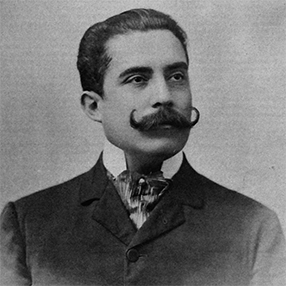The Orchids
translated from the Spanish by Alice Stone Blackwell
Freaks of bright crystal, airy beauties fair,
Whose enigmatic forms amaze the eye—
Crowns fit to deck Apollo’s brows on high,
Adornments meet for halls of splendor rare!
They spring from knots in tree-trunks, rising there
In sweet gradation; winding wondrously,
They twist their serpent stems, and far and nigh
Hang overhead like wingless birds in air.
Lonely, like pensive heads, all fetterless.
Lofty and free they bloom; by no dull chain
Their flowers to any tyrant root are bound;
Because they too, at war with pettiness,
Desire to live, like souls that know no stain,
Without one touch of contact with the ground.
Las Orquídeas
Caprichos de cristal, airosas galas
de enigmáticas formas sorprendentes,
diademas propias de apolíneas frentes,
adornos dignos de fastuosas salas.
En los nudos de un tronco hacen escalas;
y ensortijan sus tallos de serpientes,
hasta quedar en la altitud pendientes,
á manera de pájaros sin alas.
Tristes como cabezas pensativas,
brotan ellas, sin torpes ligaduras
de tirana raíz, libres y altivas;
porque también, con lo mezquino en guerra,
quieren vivir, como las almas puras,
sin un solo contacto con la tierra . . .
This poem is in the public domain. Published in Poem-a-Day on September 24, 2023, by the Academy of American Poets.
Alice Stone Blackwell’s English translation of “The Orchids” appears in Isaac Goldberg’s Studies in Spanish-American Literature (Brentano’s Publishers, 1920). It was later collected in Blackwell’s book of Spanish translations, Some Spanish-American Poets (D. Appleton and Company, 1929). The Spanish original appears in José Santos Chocano’s collection Alma América: Poemas Indo-Españoles (Librería de la Viuda de Charles Bouret, 1906). Goldberg writes, “lt is, quite naturally, the more purely American element that occupies most of the space of [Alma América]. Here is the real Chocano in all his chastened exuberance, yet exuberance nonetheless. Here is the lover of the native fauna and flora, the fellow spirit of Inca and Conquistador alike, the singer of continentalism, of union between the northern and the southern neighbors, the trumpeter of epochs. Here is the passionate singer of the cities, old and new; of the rivers and mountains; of a new world within a New World.” Citing this poem as an example, Goldberg writes, “Note how into the simple sonnet form he can infuse the epic spirit; note the epic conception even in the bold figures. And note, too, that when he approaches themes in their very nature less ample, yet no less deep, he can adjust his manner and even his metaphor to the required delicacy. [. . .] And do you see how Chocano’s rebellious spirit, now chastened, will out in the metaphor of the eleventh line, as translated?”

